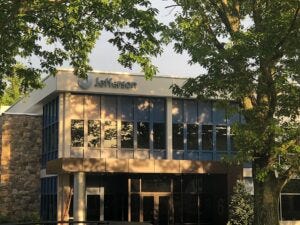Content Spotlight
Podcast: MilliporeSigma says education vital to creating unbreakable chain for sustainability
MilliporeSigma discusses the importance of people, education, and the benefits of embracing discomfort to bolster sustainability efforts.

The advanced therapy sector will weather the current financing storm, but thousands of skilled workers are still needed for it to achieve its potential, says JIB’s Parviz Shamlou.
In 2019, the Jefferson Institute for Bioprocessing (JIB) opened its doors in Philadelphia, Pennsylvania to support the sector, providing training across all functions of bioprocessing including for cell and gene therapies (CGTs), which the region is renowned for. The Institute is currently undergoing a facility expansion program that will add pilot-scale production of early phase clinical CGT material at its Lower Gwynedd (Montgomery County) facility.
Ahead of chairing a keynote panel on what’s hot in advanced in therapies at CPHI North America, Parviz Shamlou, executive director at JIB spoke to BioProcess Insider (BPI). In the first part of this interview, he spoke about the outlook of the CGT sector both in the Philadelphia area and further afield during these turbulent times.

Image: Ktstoyo via Wikimedia Commons
PS: The slowdown in CGTs is a direct result of the COVID-19 pandemic which has impacted all manufacturing sectors, and it is reasonable to say that the short-term disruption in investment in CGTs is likely to continue for the rest of 2023 and possibly 2024.
That said, I think, compared to many other sectors, in CGTs, the impact has been relatively small. In 2022, for example, investment in CGTs was nearly $7 billion, and this is expected to grow to over $17 billion in the next five years. Over 3,400 biotech companies operated in the US in 2023, nearly 7% more than in 2022. Therefore, the medium and long-term investment outlook for CGTs remains strong, which I think reflect the true power of these new therapies.
In the Greater Philadelphia area alone, which is one the largest hubs in CGTs in the country, over 40 CGTs companies are engaged in R&D, with nearly $3 billion of investments made.
PS: Looking at the success of the mRNA vaccines, one could make the case that the pandemic has fuelled some of the growth of biomanufacturing in the past couple of years. For example, earlier this month Pfizer made a $43 billion investment in Seagen – an innovator with a rich pipeline of cancer therapies based on the ADC technology.
Large investments like this in a post COVID-19 environment convinces me that the present slowdown in investment in CGTs is temporary and investments are already growing again quickly. There are still some 1,500+ clinical trials in CGTs – nearly 80% of which are in Phase I and II – and with an average timeline of nearly a decade just for phase I clinical trials, the big picture looks very strong for CGTs.
PS: We do still need thousands of skilled people added to the industry, and it’s one of the areas we have set out to address at JIB.
One solution is to use a series of ‘pooled partnership’ programs with other institutions in the country and around the world. These pooled partnerships include, for example, collaborative educational programs. We have one at master’s level with Temple University [Philadelphia], which is already sending its first cohort for the Fall of 2023. But we are also working on similar programs with Northeastern University [Boston, Massachusetts] and Villanova University [Pennsylvania] as well as several other academic institutions in the country. The intent of these pooled partnership programs is to enrich the educational and training experience of next generation of bioprocess scientists and engineers by providing them access to a one-of-kind facility at JIB.
PS: Philadelphia is the birthplace of CGT manufacturing. The first FDA approved CAR-T cell in 2017 started in Philadelphia, and the first US approved gene therapy from Spark Therapeutic was from Philadelphia. But beyond this we also see that the Greater Philadelphia region continues to invest in all of the major elements needed for a successful advanced therapy hub.
These elements include broad investment across all major therapeutic modalities, first-class translational research, availability of manufacturing space, and workforce development programs. As I said earlier, Greater Philadelphia invested over $3 billion in CGTs in 2022 alone, with universities in the Greater Philadelphia continuing to drive first-in-class and best-in-class translational research. But we also see investment in real estate, with millions of square foot of additional manufacturing space in the pipeline, and Jefferson Institute for Bioprocessing at Thomas Jefferson University is working collaboratively with other institutions and groups within the Greater Philadelphia region to address the acute need for education and training of talent for this sector.
CPHI North America, April 25-27 at Pennsylvania Convention Center in Philadelphia, will welcome thousands of attendees from over 80 countries alongside a who’s who of advanced therapy manufacturers.
You May Also Like